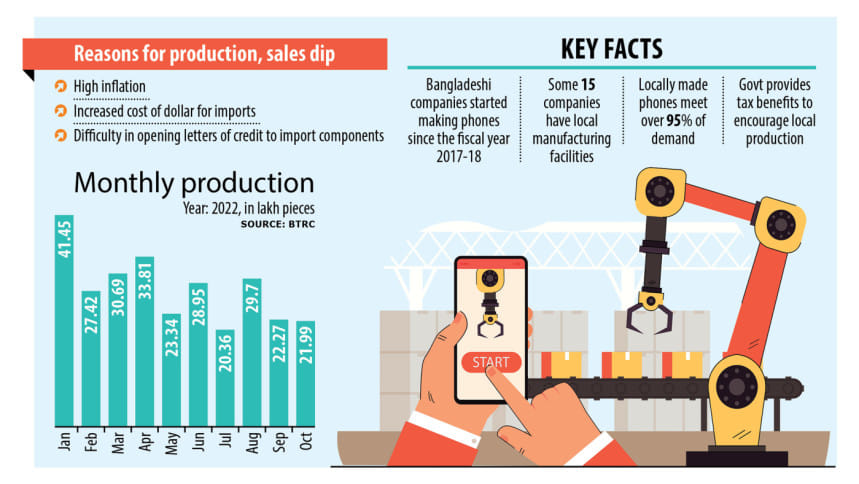Mobile handset sales fall further

The woes of the mobile manufacturing industry in Bangladesh continues as the slowdown in sales has persisted for the last eight months amid higher consumer prices.
Inflation has been on an elevated level for several months after an escalated global commodities price driven by the Russia-Ukraine war created a cost-of-living crisis in the country like in most other nations.
The depreciation of the local currency against the US dollar, the shortage of the American greenback, and the disruption in the opening of letters of credit (LCs) for raw materials amid declining foreign currency reserves have dealt a massive blow to the industry.
As a result, mobile phone manufacturing and assembling fell 1.25 per cent to 21.99 lakh in October compared to a month earlier, data from the Bangladesh Telecommunication Regulatory Commission (BTRC) showed.
A lower sales volume in recent months has forced manufacturers to cut production.
About 1.56 crore units of mobile phones were manufactured in the first five months of 2022. But in the five months to October, the number stood at 1.23 crore, a 21 per cent drop from the preceding five months.
Initially, the smartphone segment found itself at the sharp end of the current downturn after the war brought about the global economic crisis in the second quarter. Now, feature phone sales are also plummeting as higher inflation has eroded the purchasing power of consumers for months, forcing them to tighten their purse strings as uncertainty has deepened.
"The sales of all types of phones have decreased in the last six months," said Md Asraf Uddin, CEO of Anira International, which manufactures both smartphones and feature phones.
"Some months were so depressing that we were able to clock only one-third of our average sales."
A sharp appreciation of the dollar price has been a major headache for the industry. The American greenback has gained its value by about 24 per cent against the taka on the inter-bank foreign exchange market of Bangladesh since March.
Asraf says he is selling phones without making any profit.
Edison Group, which owns Symphony brand, saw a 25 per cent slump in sales in the last six months. And Md Zakaria Shahid, managing director of the manufacturer, warns the slump would continue the whole year.
The restriction on opening LCs has caused a slowdown in production as well.
Amid the sharp fall in foreign currency reserves for the escalated import payments, the government has moved to limit the purchases of non-essential and luxury items.
The reserves slipped to $34.4 billion recently from $46.4 billion at the end of 2020-21 and $41.83 billion at the end of the last financial year.
"Due to policies aimed at safeguarding reserves, the LC opening has become difficult and time-consuming. This is disrupting production," Shahid said.
"Sales would bounce back if the dollar price comes down and inflation cools."
The rising price of devices has also pushed down sales.
Owing to the costly dollar, the price of a Tk 10,000 handset has gone up to Tk 12,500, eating into the profits of manufacturers.
Md Sajeeb, a salesperson of Rio International, a mobile phone retailer in the capital's Bashundhara City Shopping Mall, said sales dropped by almost 40 per cent in the last few months.
Samiul Islam, who is now preparing for a job after completing his post-graduation, said he has had to ditch the plan to buy a new mobile phone since his old phone is still functioning and household expenses have gone up for the sharp rise in the prices of essential commodities.
Inflation was 8.91 per cent in October. It stood at 9.10 per cent in September after surging to a 10-year high of 9.52 per cent in August.
A total of 2.95 crore phones were manufactured in Bangladesh in 2021. Of them, about 30 per cent were smartphones.
In the first 10 months of 2022, only 3.42 lakh units of mobile phones were imported. Local production totalled 2.79 lakh units.
In the financial year of 2021-22 that ended in June, imports met 37 per cent of the country's handset demand. But it fell to 1.2 per cent in the 10 months to October.
In Bangladesh, local handset production has made an impressive stride in recent years, aided by the government's huge tax benefits unveiled in the fiscal year of 2017-18.

 For all latest news, follow The Daily Star's Google News channel.
For all latest news, follow The Daily Star's Google News channel. 



Comments